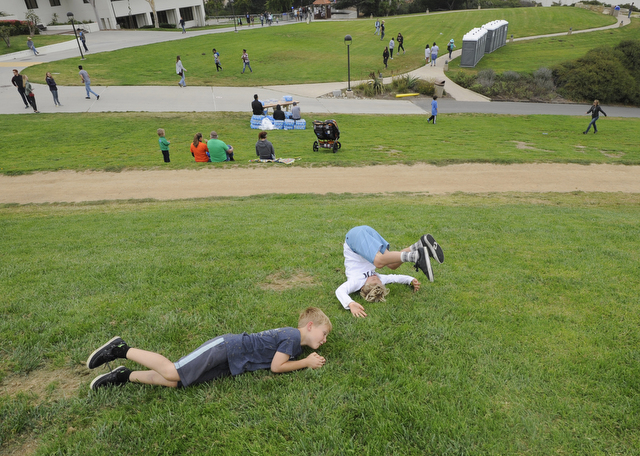‘Crazy Talk’ with Bernie Sanders
6,000 Gather at City College to Hear Prez Candidate
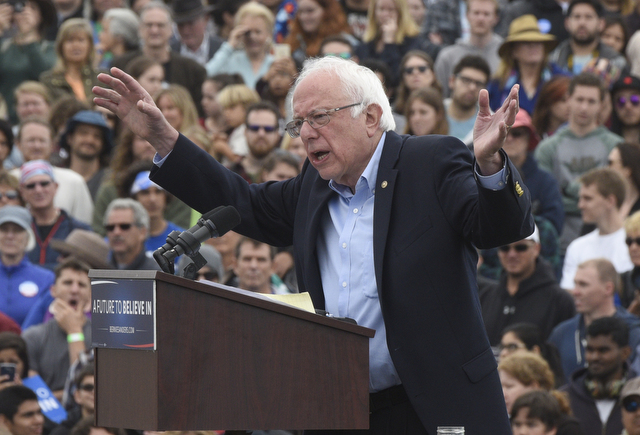
The only thing burning through the mid-morning fog blanketing the sweeping grassy knoll at City College’s West Campus this Saturday was the voice of Democratic presidential candidate — and Vermont Senator — Bernie Sanders, still vying for his party’s nomination. Sanders made it clear he was not going into the good night of historical and mathematical inevitability ascribed to Hillary Clinton’s eventual victory.
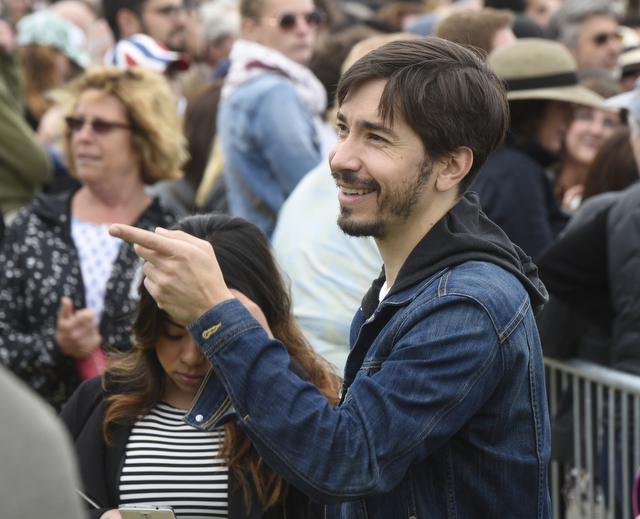
After getting a warm-up from actor Justin Long, Sanders was introduced to almost 6,000 attendees by longtime entertainer Dick Van Dyke, who called the Senator “the sanest man in America.” But SBCC professor and Secretary of the California Democratic Party Daraka Larimore-Hall stole the opening acts with a fiery speech. He urged the crowd not just to vote for Sanders but to phone-bank and canvas alongside him.
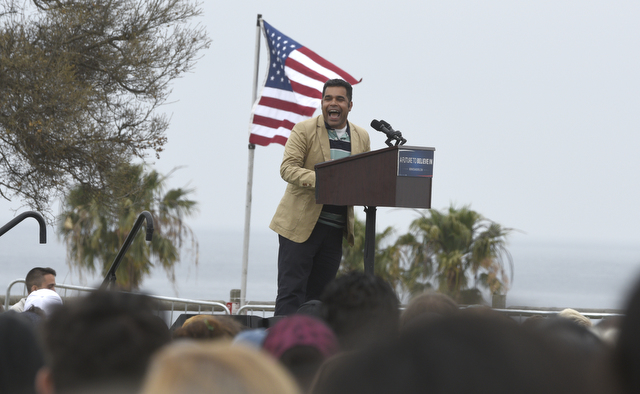
The thousands of the Vermont Senator’s supporters turned out on a cold, misty morning, waiting hours in long lines that started winding through the parking lots before 6 a.m. For the first time in most California resident’s lives, this primary has a chance — albeit a slim one — to truly impact the election. With Sanders being down just 270 pledged delegates, a big win in California could be huge for his campaign.
Parents Nico and Amara Azios got their kids out of bed early on a Saturday morning to see him. “We all know California is big for the primary,” Nico said. “We wanted to be a part of something that is really important not just for everybody, but more so for our kids.”
The Azios family weren’t the only ones to come for the show.
“We were hoping to see a potentially historic event,” said Paul Lynch, who brought his two children as well.
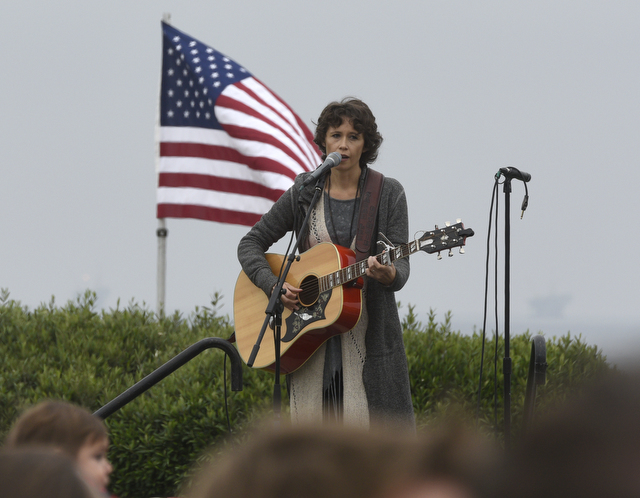
This morning’s rally had a laid-back vibe typical of a Santa Barbara crowd. Folk singer Sarah Lee Guthrie and husband Johnny Irion sang her grandfather’s famous “This Land Is My Land,” with the crowd.
At the podium, Sanders didn’t utter a single critical word about Clinton — other than to hope she’d see fit to change her positions on a couple issues — and not that much even about putative Republican nominee Donald Trump. But as Sanders zigzags throughout the State of California, making campaign pit stops at community colleges as he goes, he made it clear he was still very much in it.
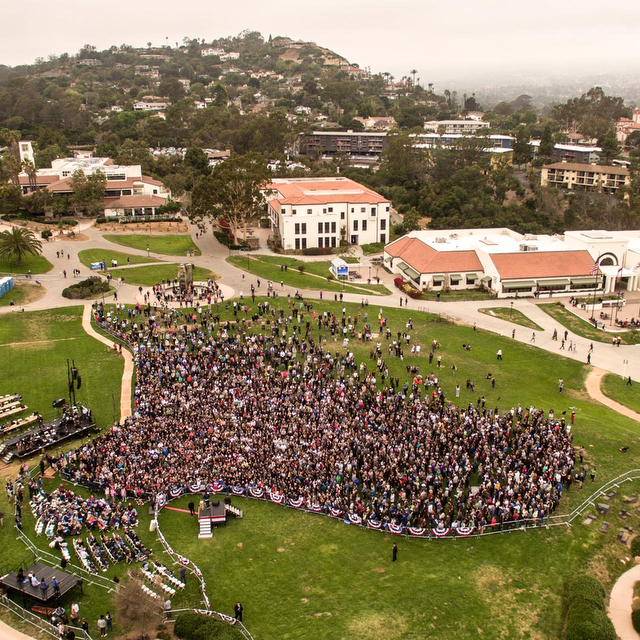
Despite overwhelming odds, Sanders noted he’d won 20 state primaries and caucuses and was gunning for California’s pot of political gold— 475 delegates — up for grabs in the June 7 primary. “We’re going to go into the Democratic convention with a lot of momentum,” he vowed. “And we’re going to go back out with the Democratic nomination.” After that, Sanders predicted he would not merely defeat Trump, but “demolish” him.
Sanders dispensed with Trump in almost a desultory fashion, describing how he’d challenged Trump to a debate only to be told it was on, then off, then on again, and most recently off. If and when Trump changes his mind, Sanders said he would demand an explanation of how Trump could be so insulting to Mexicans, Latinos, women, veterans, and African Americans. He highlighted the fact that Trump had helped lead the “birther bandwagon,” which for years questioned if President Barack Obama was in fact an American citizen. “He was trying to de-legitimize the presidency of the first African American in the history of the United States.” Sanders said.
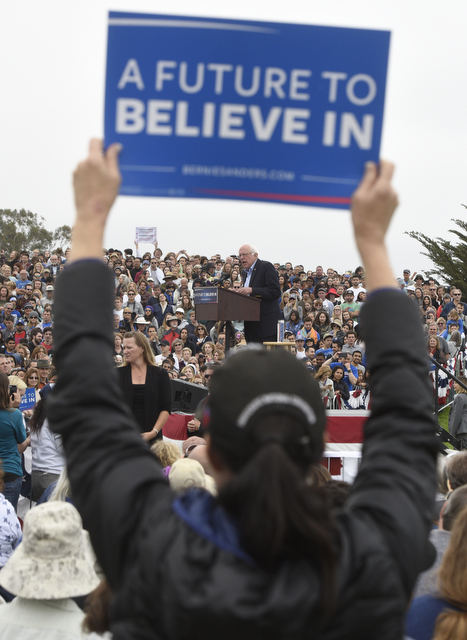
Mostly, however, Sanders, seemed intent on banging the gong of his “bottom-up” revolution and preaching the gospel of economic, racial, and environmental justice. It was not enough to tinker at the edges, he told the crowd, and consider it a victory if only 15 million people went without health care as opposed to 25 million. “Health care” he thundered, “should be a right, not a privilege.”
There were no hecklers, and the crowd responded warmly to Sanders’ message. Sanders vamped on the shortcomings of the American medical system, using the word “crazy” as a point of departure for an extended riff. “’Crazy’ is one out of five Americans getting medical prescriptions that they’re unable to pay for,” he said. “’Crazy’ is that last year the top five pharmaceutical companies made $55 billion in profits, and ‘crazy’ is the United States spending more on health care than any other country and having so little to show for it.”
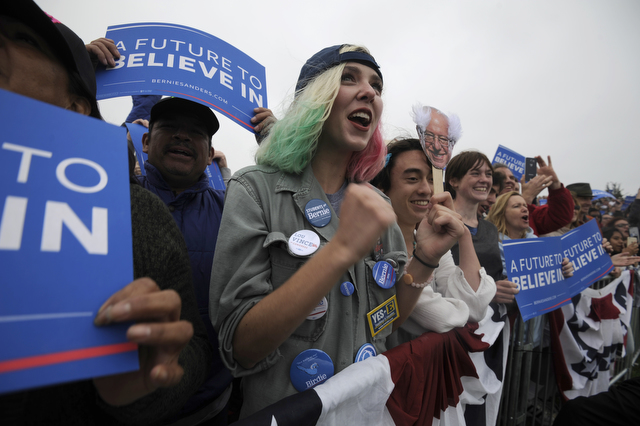
Sanders delved into the issue of campaign finance reform, declaring, “The billionaires already own the country; we’re not going to let them buy the United States government.” The answer he said, was publicly financed elections and the legislative repeal of Citizens United, the landmark Supreme Court ruling allowing corporations and trade unions to make unlimited campaign donations on the grounds that campaign spending qualified as political speech.
The billionaires, Sanders argued, have taken control of government to rig the economy in their favor. As a result, he contended, the middle class has all but disappeared in the past 30 years while those at the top have enjoyed intense concentrations of wealth not enjoyed in this country since the days of the robber barons.
The top one-tenth of one percent now control as much wealth as the bottom 90 percent, he asserted; the richest 20 people have about the same as the poorest half of our population — about 152 million people. Just one family — the Waltons of Walmart fame — own wealth equal to the bottom 40 percent of Americans. Walmart pays such low wages, Sanders objected, that many Walmart workers needed food stamps and Medicaid to survive economically. The middle class, he continued, subsidized the Walton family in the form of higher taxes to cover the cost of food stamps. “I say to the Walton family, get off welfare,” he said.

View a photo essay of the rally here.
Santa Barbara County was not exempt from Sanders’ critique. The City of Santa Barbara, he noted, was one of the 10 most expensive places to live, while the county ranks fourth in statewide poverty rates and one-half of public school students qualify for free and reduced meals.
The wage gap between men and women, Sanders decried, still exists, with women making 79 cents on average for every $1 their male coworkers take home. “Today women want the whole damn dollar.”
The 5 percent unemployment rate, he said, understates the real economic hardship experienced by working Americans by about 100 percent because those working multiple jobs or who have given up are not counted. He outlined an ambitious program to put 13 million people to work by launching a massive infrastructure repair program for the nation’s roads, bridges, water systems, levies, and dams. Though Sanders never mentioned Clinton by name, he was sharply critical of free trade agreements supported by Clinton and her husband, former President Bill Clinton, which Sanders claimed put 60,000 factories out of work.

He lambasted the United States for having the highest number of people behind bars — 2.2 million — more than any nation on the planet, at a cost to taxpayers of $80 billion a year. “Eighty!” he exclaimed for emphasis. The war on drugs, he said, has been an absolute bust. He vowed to remove marijuana from the federal Controlled Substance Act, which lists pot as dangerous as heroin. He noted that four states and the District of Columbia have legalized pot outright, and he said that if he lived in California he would support the statewide ballot initiative that would do the same here in November. In the meantime, states like Vermont have been hard hit by heroin and opioid epidemics, leading to massive numbers of overdose deaths. If elected, he vowed to take more aggressive action but to treat the problem as a medical issue rather than a criminal matter. Mental health care, he said, clearly needs to be given higher priority. “We need to make sure mental health treatment is available to all people when they need it, not six months from now.”
Sanders has come under attack for his promise of free tuition for public colleges and universities; skeptics contend it can’t be accomplished without increasing taxes. Sander said that when he gets attacked, he tends to repeat what he said. This Saturday, he did just that, calling for free tuition for anyone attending community colleges and public universities. “This is nuts. This is crazy stuff,” he said of the intense debt many students are forced to take on to graduate. Doctors and dentists, he said, graduate owing $300,000-$400,000. Typical undergraduates leave school owing $50,000-$70,000.
In response to critics wondering how Sander proposed to pay for this, the candidate recounted how the government bailed out the banking industry during the collapse that led to the worst recession short of the Great Depression. No one, he noted, went to jail. “Today Wall Street is doing fine. Now it’s their turn to help the middle class.”
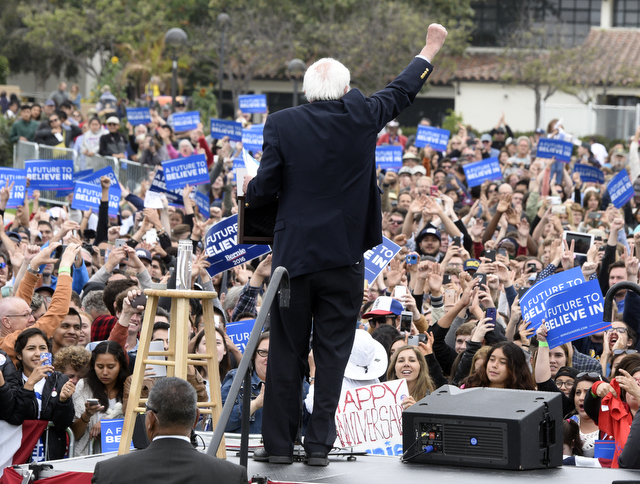
Most Democratic candidates now running for office in the June primaries were conspicuous by their absence. Given that congressional candidates Salud Carbajal and Helene Schneider have endorsed Hillary Clinton, as have 1st District candidate Das Williams and State Assembly candidate Monique Limón, their presence might have proven awkward. Third District candidate Jay Freeman, however, had volunteers working the crowd and placed a campaign literature table near the event‘s entrance. Bill Ostrander, a Democratic candidate for the 24th Congressional District, was also present. Ostrander is singing from the Sander’s hymnal, excoriating the corrupting influence of campaign contributions. In fact, he printed bumper stickers reading “Feel the Bill.”
Among the many faces in the crowd, former SBCC student Ganenthra Ravindran was there to experience his first presidential rally. “I am from a foreign country, and this is the closest I believe I’ll get to a presidential candidate,” Ravindran said. He came from Malaysia in 2014 after googling cities in America.
While he doesn’t call himself a Sanders fan, Ravindran thinks Sanders is the best of the bunch. “Any day he’s a better candidate than Hillary and Trump.”
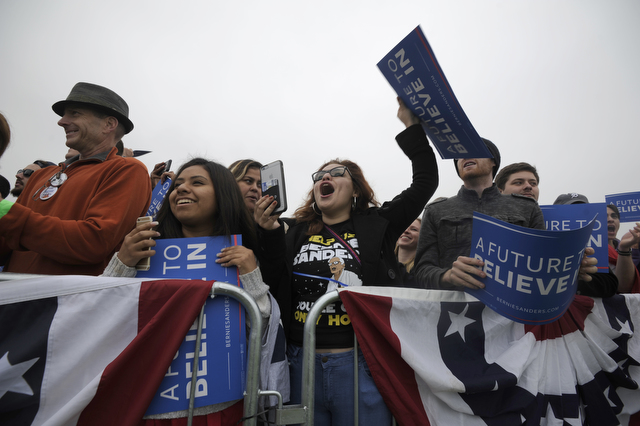
And while many attending felt the same, what they planned to do if Sanders fails to win the primary remains a point of contention for his supporters. Paul Lynch said he would vote for Hillary Clinton because of the way the two-party system is setup. “I guess I’ll fall in line,” he admitted a bit sheepishly.
Though a big win in California could be a big momentum swing for Sanders, it’s a long shot at the nomination. He’ll need to take a majority of the pledged count in California, but the numbers aren’t looking good for the senator. While he’s been gaining in recent days, Sanders remains behind by 2 percent in the latest Public Policy Institute of California poll.
And Clinton has a massive 498 lead in superdelegates. They don’t officially cast their votes until the convention, and while California could shake things up, Sanders will need a miracle to take the primary now.
Ed. Note: This story has been changed to remove the reference to the Ventura rally’s DMX song, which did not play. This version also removed the reference to 3rd District supervisor candidate Joan Hartmann endorsing Hillary Clinton; Hartmann attended the meet-and-greet for Bill Clinton at the Canary recently.
